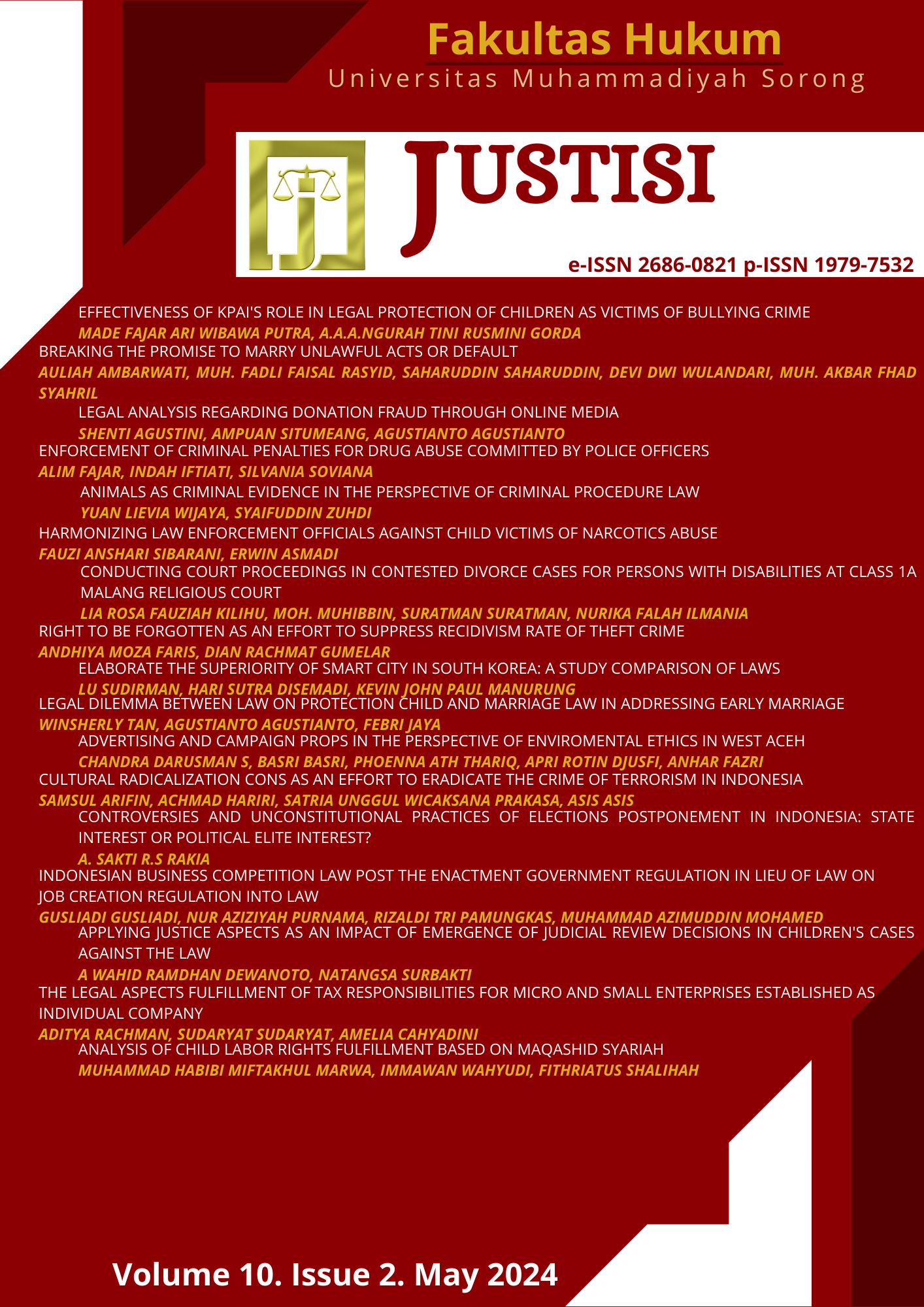Right To Be Forgotten as an Effort to Suppress Recidivism Rate of Theft Crime
DOI:
https://doi.org/10.33506/js.v10i2.2932Keywords:
Ex-convicts, Recidivist, Right to Be ForgottenAbstract
This research’s background is from the thievery recidivist cases that appear frequently. The recidivist case itself, as the general public has known for a long time, is caused by various factors, one of them being an economic factor. This differs from state officials’ corruption cases that did not have any correlation with the economic condition of the defendants. The aim of this research is to prove that the Right to Be Forgotten can be a solution for decreasing the number of thievery recidivist criminal acts in In the current digital era, there is a close connection with digital footprints, making job opportunities for theft ex-convicts limited. This aspect is then one of the main focuses of the study. This article uses the normative juridical as a research method by utilizing relevant literature from other journal articles, books, and related documents. The results of the research’s is that to support the new penal system where the rehabilitative and the humanism aspects are being highlighted, the act of “clearing name” for ex-convicts is needed to support them to have more job options after they get out of the prison other than owning a Small and Medium Enterprise (SMEs) with the skills they got when they were in the prison. The reason for that is with the development of technology, one of the indicators for hiring someone is to watch out for their record, both on the internet and social media.
References
Ampri, Aliya Ilysia Irfana, and Muhammad Deckri Algamar. “Hak Untuk Dilupakan: Penghapusan Jejak Digital Sebagai Perlindungan Selebriti Anak Dari Bahaya Deepfake.” Jurnal YUSTIKA Media Hukum Dan Keadilan 25, no. 1 (2022).
Andre, K.H. “Peran Kejaksaan Dalam Penuntutan Tindak Pidana Pencurian Dengan Kekerasan.” Universitas Lampung, 2019.
Berkelaar, Brenda L., and Patrice M. Buzzanell. “Online Employment Screening and Digital Career Capital: Exploring Employers’ Use of Online Information for Personnel Selection.” Management Communication Quarterly 29, no. 1 (2015).
Chub, Elena S. “The Right to Be Forgotten: A New Human Right?” Digital Law Journal 3, no. 4 (2022).
Fazel, Seena, and Achim Wolf. “A Systematic Review of Criminal Recidivism Rates Worldwide: Current Difficulties and Recommendations for Best Practice.” PLoS ONE 10, no. 6 (2015).
Gunadi, and Oci Senjaya. PENOLOGI DAN PEMASYARAKATAN. Edited by Dina Widayanti and Siti Lazmi Latifah. Yogyakarta: Deepublish, 2020.
Hairi, Prianter Jaya. “Konsep Dan Pembaruan Residivisme Dalam Hukum Pidana Di Indonesia (Concept and Reform of Recidivism in Criminal Law in Indonesia).” Negara Hukum: Membangun Hukum Untuk Keadilan Dan Kesejahteraan 9, no. 2 (2018).
Ham, Humas Kementerian Hukum dan. “KUHP BARU MENGGUNAKAN PARADIGMA HUKUM PIDANA MODERN.” Kementerian Hukum dan Hak Asasi Manusia RI, 2023.
Harahap, Ahmad Rizky Fauzan. “IDENTIFIKASI TINGKAT RESIDIVISME NARAPIDANA TERHADAP PROGRAM ASIMILASI DAN INTEGRASI COVID-19 DI INDONESIA.” JUSTITIA : Jurnal Ilmu Hukum Dan Humaniora 8, no. 4 (2021).
Hayati, Mutiara Nur. “Praktik Self-Tracking Di Media Sosial Pemuda Pada Transisi Menuju Dunia Kerja.” Jurnal Studi Pemuda 11, no. 2 (2022).
Hermanto, Indra Prayoga, and Arinto Nurcahyono. “Tinjauan Sosiologi Hukum Terhadap Residivis Tindak Pidana Pencurian Sepeda Motor Di Kabupaten Banggai.” Jurnal Riset Ilmu Hukum (JRIH) 2, no. 2 (2022).
Hidaya, Wahab Aznul. “The Role of Witness and Victim Protection Agency for Imekko Tribe in Criminal Justice System in Sorong” 8, no. 2 (2023): 176–91. https://doi.org/10.23917/laj.v8i2.2363.
Hidaya, Wahab Aznul, Hadi Tuasikal, and Siti Afiyah. “GREEN RESTORATIVE JUSTICE : ENVIRONMENTAL ENFORCEMENT AND a Deni Setiyawan , b Wahab Aznul Hidaya , c Hadi Tuasikal , d Siti Afiyah,” 2024, 1–24.
Hutapea, Sintong Arion. “RIGHT TO BE FORGOTTEN SEBAGAI BENTUK REHABILITASI BAGI KORBAN PELANGGARAN DATA PRIBADI.” Jurnal HAM Dan Ilmu Hukum (Jurisprudentia) 1, no. 1 (2021).
Ibipurwo, Guruh Tio, Yusuf Adi Wibowo, and Joko Setiawan. “Pencegahan Pengulangan Kekerasan Seksual Melalui Rehabilitasi Pelaku Dalam Perspektif Keadilan Restoratif.” Jurnal Hukum Respublica 21, no. 2 (2022).
Irmawanti, Noveria Devy, and Barda Nawawi Arief. “Urgensi Tujuan Dan Pedoman Pemidanaan Dalam Rangka Pembaharuan Sistem Pemidanaan Hukum Pidana.” Jurnal Pembangunan Hukum Indonesia 3, no. 2 (2021).
Jones, Meg Leta. Ctrl Z: The Right to Be Forgotten. New York: New York University Press, 2016.
Karelina, Yola, and Muh. Endriyo Susila. “Faktor Kriminologi Narapidana Residivis Pencurian Di Lembaga Pemasyarakatan Kelas II B Kota Tasikmalaya.” Indonesian Journal of Criminal Law and Criminology 2, no. 2 (2021).
Ma’ruf, Amar, and Zulharman. “REINTEGRASI SOSIAL BAGI WARGA BINAAN LEMBAGA PEMASYARAKATAN KELAS IIA WATAMPONE.” Jurnal Darussalam: Pemikiran Hukum Ketatanegaraan Dan Perbandingan Madzhab 3, no. 1 (2023).
Mubarok, Husni, and Yeni Yulianti. “Peluang Dan Tantangan Era Baru Sistem Pemidanaan Indonesia.” Restorative: Journal of Indonesian Probation and Parole System 1, no. 1 (2023).
Panggabean, Mompang L. Pokok-Pokok Hukum Penitensier Di Indonesia. Jakarta: UKI Press, 2005.
Rahman, Abd., and Heriyanto. “MEMASYARAKATKAN HUKUM: PEMBAHARUAN HUKUM YANG DINAMIS GUNA MEWUJUDKAN EFEKTIVITAS PENEGAKAN HUKUM YANG BERKEADILAN.” HUKMY 1, no. 1 (2021).
Satria, Hariman. “Restorative Justice: Paradigma Baru Peradilan Pidana.” Jurnal Media Hukum 25, no. 1 (2018).
Simarmata, Dhea Natalie, Mukhlis R, and Tengku Arif Hidayat. “BATASAN PENGGUNAAN HAK UNTUK DILUPAKAN BERDASARKAN PASAL 26 UNDANG-UNDANG NOMOR 19 TAHUN 2016 TENTANG PERUBAHAN ATAS UNDANG-UNDANG NOMOR 11 TAHUN 2008 TENTANG INFORMASI DAN TRANSAKSI ELEKTRONIK TERHADAP MANTAN NARAPIDANA DI INDONESIA.” Jurnal Online Mahasiswa 10, no. 1 (2023).
Sudarto. Kapita Selekta Hukum Pidana. Bandung: Alumni, 1996.
Sutanti, Rahmi Dwi. “Kebijakan Aplikatif Pemberatan Pidana Bagi Pelaku Pengulangan Tindak Pidana.” Indonesian Journal Of Criminal Law Studies IJCLS II Universitas Negeri Semarang 2, no. 1 (2017).
Weber, Rolf H. “The Digital Future: A Challenge for Privacy?” Computer Law & Security Review 31 (2015).
———. “The Right to Be Forgotten: More than a Pandora’s Box?” Journal of Intellectual Property, Information Technology and E-Commerce (JIPITEC), 2011.
Wediana, Nabila Athifa, and Ira Darmawanti. “Modeling Pada Residivis Pencurian Ditinjau Dari Perspektif Bandura Modeling in the Theft Recidivists from the Perspective of Bandura.” Jurnal Penelitian Psikologi 10, no. 1 (2023).
Wulandari, S. “Efektifitas Sistem Pembinaan Narapidana Di Lembaga Pemasyarakatan Terhadap Tujuan Pemidanaan.” Jurnal Ilmiah Hukum Dan Dinamika Masyarakat 9, no. 2 (2016).
Wulansari, Oktaviani, and Puti Priyana. “FAKTOR PENYEBAB SEORANG MENJADI RESIDIVIS ATAS PENGULANGAN TINDAK PIDANA PENCURIAN KENDARAAN SEPEDA BERMOTOR ( CURANMOR ).” JUSTITIA : Jurnal Ilmu Hukum Dan Humaniora 9, no. 3 (2022).
Yuliana Debora Kambu, Wahab Aznul Hidaya. “Peran Jaksa Dalam Penyelesaian Tindak Pidana Korupsi.” Journal of Law 53, no. 9 (1981): 1689–99.
Zamani, Labib. “Santunlah Di Medsos, Perusahaan Akan Cek Rekam Jejak Sebelum Terima Karyawan.” Kompas.com, 2017.
Downloads
Published
How to Cite
Issue
Section
License
Copyright (c) 2024 Andhiya Moza Faris, Dian Rachmat Gumelar

This work is licensed under a Creative Commons Attribution-ShareAlike 4.0 International License.











